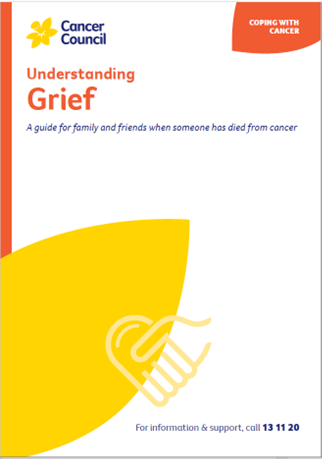- Home
- About Cancer
- Advanced cancer
- Facing end of life
- Caring for someone who is dying
- After the death
- Grief
Grief
What is grief?
The response you have to losing someone is called grief. This loss can impact many areas of your life – from the physical, mental and emotional, to the social and spiritual.
Different types of grief
You may feel grief for people you loved very much, but you may also feel grief if you lose someone you had a complicated relationship with, or hadn’t seen in a long time.
Common reactions to grief
You may feel sad, numb, disbelief, lonely, guilty, angry, relieved or accepting.
It’s common to have trouble sleeping, cry a lot or have difficulty crying, lose your appetite, or not be interested in your usual activities. You may feel tired or lack energy, be forgetful or not able to concentrate, or not want to go out and do things you usually would.
Some people have a big emotional reaction right away, but other people may “get on with life” for a while before feelings of grief happen.
There’s no right or wrong way to grieve, and everyone mourns in their own way and in their own time.
Adapting to loss
Coping with grief doesn’t mean getting over the person’s death. It’s about finding ways to adapt to the loss. It may be according to religious or spiritual practices, but it can also be more personal.
Even though your relative or friend is no longer physically present, they remain part of you and your life. This ongoing connection can be a source of comfort in your grief.
The unpredictability of grief
You might feel pressure from yourself or others to get over it and get on with life, but grief has no set stages or time line. It can seem like a roller-coaster – sometimes you might feel yourself “coming good” and then swiftly go downhill again for a while.
The sorrow may never go away completely, but most people gradually adapt to the loss. The pain will usually become less intense as you come to terms with how your life has changed.
Seeking support for grief
Sometimes, the pain does not seem to ease over time. If you’re concerned that your grief is stopping you from living your life, professional support may be helpful. At any stage of grief, you can call Cancer Council on 13 11 20 to talk about how you are feeling or connect with further support. The palliative care team may also offer support.
For more on this, see Understanding grief.
→ READ MORE: End-of-life support and information
Podcast: Coping with Grief
Listen to more episodes from our podcast for people affected by advanced cancer
Prof Jane Phillips, Head, School of Nursing and Professor, Centre for Healthcare Transformation, Queensland University of Technology and Emerita Professor Palliative Nursing, University of Technology Sydney, NSW; Prof Meera Agar, Palliative Care Physician, Professor of Palliative Medicine, University of Technology Sydney, IMPACCT, Sydney, NSW; Sandra Anderson, Consumer; A/Prof Megan Best, The University of Notre Dame Australia and The University of Sydney, NSW; Prof Lauren Breen, Psychologist and Discipline Lead, Psychology, Curtin University, WA; David Dawes, Manager, Spiritual Care Department, Peter MacCallum Cancer Centre, VIC; Rob Ferguson, Consumer; Gabrielle Gawne-Kelnar, Counsellor, Psychotherapist and Social Worker, One Life Counselling & Psychotherapy, NSW; Justine Hatton, Senior Social Worker, Southern Adelaide Palliative Services, Flinders Medical Centre, SA; Caitlin MacDonagh, Clinical Nurse Consultant, Palliative Care, Royal North Shore Hospital, Northern Sydney Local Health District, NSW; McCabe Centre for Law and Cancer; Palliative Care Australia; Belinda Reinhold, Acting Lead Palliative Care, Cancer Council QLD; Xanthe Sansome, National Program Director, Advance Care Planning Australia; Kirsty Trebilcock, 13 11 20 Consultant, Cancer Council SA.
View the Cancer Council NSW editorial policy.
View all publications or call 13 11 20 for free printed copies.
